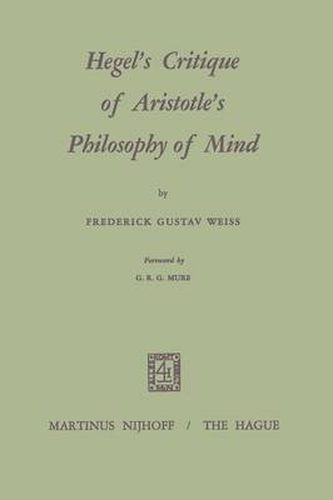Readings Newsletter
Become a Readings Member to make your shopping experience even easier.
Sign in or sign up for free!
You’re not far away from qualifying for FREE standard shipping within Australia
You’ve qualified for FREE standard shipping within Australia
The cart is loading…






This title is printed to order. This book may have been self-published. If so, we cannot guarantee the quality of the content. In the main most books will have gone through the editing process however some may not. We therefore suggest that you be aware of this before ordering this book. If in doubt check either the author or publisher’s details as we are unable to accept any returns unless they are faulty. Please contact us if you have any questions.
At opposite ends of over two millenia Hegel and Aristotle, virtually alone of the great European thinkers, consciously attempted to criticize and develop the thought of their predecessors into systems of their own. Both were thus committed in principle to the view that philosophy in each age of civilization is at once a product, a criticism, and a recon struction of the values and insights of its own past; that the fertile mind can only beget anew when it has acknowledged and understood a line of ancestors which has led to its begetting; that the thinker as little as the artist can start with a clean slate and a blankly open-minded atti tude to the world which he finds within him and before him. Man is by definition rational; philosophy is his continuous impulse to grasp and appraise a single universe of which he finds himself a part; philosophy therefore contains its history as a constituent element of its own nature, and the developmental character of philosophy must - unless human reason is, unthinkably and unarguably, a mere delusion - in some sense reflect, or even be in some sense identical with, an essentially develop mental universe - that is roughly the common creed of Aristotle and Hegel. Both of them further believed, as Plato had believed, that what is most real and intelligible in that universe is eo ipso most good.
$9.00 standard shipping within Australia
FREE standard shipping within Australia for orders over $100.00
Express & International shipping calculated at checkout
This title is printed to order. This book may have been self-published. If so, we cannot guarantee the quality of the content. In the main most books will have gone through the editing process however some may not. We therefore suggest that you be aware of this before ordering this book. If in doubt check either the author or publisher’s details as we are unable to accept any returns unless they are faulty. Please contact us if you have any questions.
At opposite ends of over two millenia Hegel and Aristotle, virtually alone of the great European thinkers, consciously attempted to criticize and develop the thought of their predecessors into systems of their own. Both were thus committed in principle to the view that philosophy in each age of civilization is at once a product, a criticism, and a recon struction of the values and insights of its own past; that the fertile mind can only beget anew when it has acknowledged and understood a line of ancestors which has led to its begetting; that the thinker as little as the artist can start with a clean slate and a blankly open-minded atti tude to the world which he finds within him and before him. Man is by definition rational; philosophy is his continuous impulse to grasp and appraise a single universe of which he finds himself a part; philosophy therefore contains its history as a constituent element of its own nature, and the developmental character of philosophy must - unless human reason is, unthinkably and unarguably, a mere delusion - in some sense reflect, or even be in some sense identical with, an essentially develop mental universe - that is roughly the common creed of Aristotle and Hegel. Both of them further believed, as Plato had believed, that what is most real and intelligible in that universe is eo ipso most good.